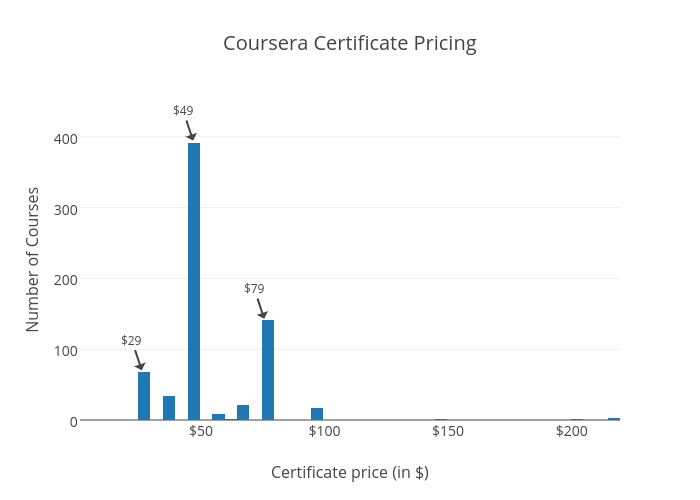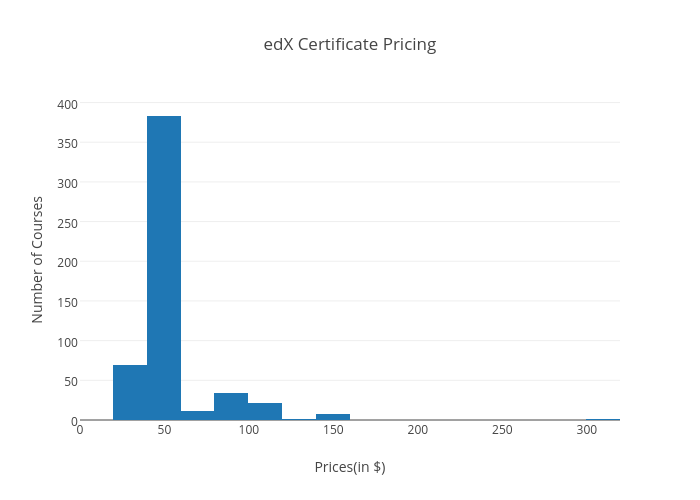Live Feed from Class Central
Mooc Report
This article is just one in our 2015 MOOC Roundup Series. Find the whole series of articles here, and discover everything MOOCs in 2015 — from the most popular classes, to overviews on developments in MOOC platforms, to looking at the MOOC-future.
It started with Udacity.
Udacity stopped offering free certificates in May 2014. Coursera followed up in November, announcing that they were phasing out free certificates. FutureLearn had never offered a free certificate to begin with.
The only MOOC provider that was left offering free certificates was edX. Unfortunately, earlier this month on December 7, edX CEO Anant Agrawal announced that edX would no longer offer free honor code certificates.

edX — no option to earn a free honor code certificate
Now that free certificates are no longer an option, how much does it take to get a certificate from the major MOOC providers? We take a look.
RELATED
Eyeing Revenue Sustainability: The Two Biggest MOOC Providers Adapt How Their Courses Work
Udacity
$200/Month – Nanodegree Cost
Udacity have stopped giving out certificates (free or paid) at all for their courses. Instead, the company announced Nanodegrees last year. They’re 4-12 month programs designed to teach relevant tech skills. Nanodegrees cost $200/month, and they can be done at your own pace, but Udacity gives you half the money back if you complete your Nanodegree within twelve months. Udacity became the first MOOC provider to reach profitability, due in large part to these Nanodegrees.

My first certificate from the original AI class that spawned Udacity
Coursera

~700 courses and Capstone projects with Verified Certificates
$49 median price, $56 average price
Price ranges from $29 – $215
Coursera offers two kinds of certificate: Verified and Specialization. A specialization is a sequence of courses that culminate into a capstone project at the end. Currently 45% of all Coursera courses offer a verified certificate. Below is a quick analysis of course pricing from Class Central user Ronny De Winter:

~530 courses with Verified Certificates
$50 median price, $53 average price
Price ranges from $25 – $300
EdX offers four different types of certificate: Verified, Professional Education, Credit, and XSeries.
For its Verified Certificates, edX follows a similar pricing strategy to Coursera; there is hardly any difference between the median and average price between edX and Coursera. EdX’s Professional Education courses start at $49 and can go as high as $949. The Professional Education courses are closed courses, and there is no free version of these courses.
FutureLearn
FutureLearn has a flat pricing model for its certificates. FutureLearners can get a digital Statement of Participation as well as a printed copy for £34 (GBP). In September, FutureLearn introduced modern and visually stunning digital certificates.
This article is just one in our 2015 MOOC Roundup Series. Find the whole series of articles here, and discover everything MOOCs in 2015 — from the most popular classes, to overviews on developments in MOOC platforms, to looking at the MOOC-future.
The post MOOC Trends in 2015: The Death of Free Certificates appeared first on Class Central's MOOC Report.
Continue reading...
It started with Udacity.
Udacity stopped offering free certificates in May 2014. Coursera followed up in November, announcing that they were phasing out free certificates. FutureLearn had never offered a free certificate to begin with.
The only MOOC provider that was left offering free certificates was edX. Unfortunately, earlier this month on December 7, edX CEO Anant Agrawal announced that edX would no longer offer free honor code certificates.

edX — no option to earn a free honor code certificate
Now that free certificates are no longer an option, how much does it take to get a certificate from the major MOOC providers? We take a look.
RELATED
Eyeing Revenue Sustainability: The Two Biggest MOOC Providers Adapt How Their Courses Work
Udacity
$200/Month – Nanodegree Cost
Udacity have stopped giving out certificates (free or paid) at all for their courses. Instead, the company announced Nanodegrees last year. They’re 4-12 month programs designed to teach relevant tech skills. Nanodegrees cost $200/month, and they can be done at your own pace, but Udacity gives you half the money back if you complete your Nanodegree within twelve months. Udacity became the first MOOC provider to reach profitability, due in large part to these Nanodegrees.

My first certificate from the original AI class that spawned Udacity
Coursera

~700 courses and Capstone projects with Verified Certificates
$49 median price, $56 average price
Price ranges from $29 – $215
Coursera offers two kinds of certificate: Verified and Specialization. A specialization is a sequence of courses that culminate into a capstone project at the end. Currently 45% of all Coursera courses offer a verified certificate. Below is a quick analysis of course pricing from Class Central user Ronny De Winter:
- The majority of Coursera courses are priced at $49. This seems to be the default; $50 is also a well known threshold in marketing for online consumption.
- The second largest group consists of courses with a price tag of $79. These look like courses for skills with a high demand in the job market: mainly IT, programming, and business-related courses.
- The third largest group consists of courses with a price of $29. These are almost all in Chinese, Spanish, or Portuguese, so they are probably targeting developing countries.
- Finally there are a few courses over $100. They’re mostly capstone courses for business and leadership related topics.

~530 courses with Verified Certificates
$50 median price, $53 average price
Price ranges from $25 – $300
EdX offers four different types of certificate: Verified, Professional Education, Credit, and XSeries.
For its Verified Certificates, edX follows a similar pricing strategy to Coursera; there is hardly any difference between the median and average price between edX and Coursera. EdX’s Professional Education courses start at $49 and can go as high as $949. The Professional Education courses are closed courses, and there is no free version of these courses.
FutureLearn
FutureLearn has a flat pricing model for its certificates. FutureLearners can get a digital Statement of Participation as well as a printed copy for £34 (GBP). In September, FutureLearn introduced modern and visually stunning digital certificates.
This article is just one in our 2015 MOOC Roundup Series. Find the whole series of articles here, and discover everything MOOCs in 2015 — from the most popular classes, to overviews on developments in MOOC platforms, to looking at the MOOC-future.
The post MOOC Trends in 2015: The Death of Free Certificates appeared first on Class Central's MOOC Report.
Continue reading...
